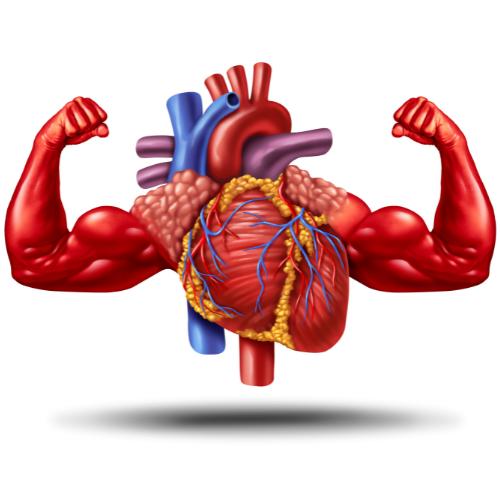Is running good for your heart and lungs?
In this article, we’ll explore the numerous advantages of running and how it can improve your cardiovascular health.
So, lace up your running shoes, and let’s dive in!
Contents
Is Running Good for Your Heart and Lungs? The Impact of Running on Your Heart and Lungs
Running is a high-intensity aerobic exercise that significantly impacts your cardiovascular system. Regular running sessions can enhance the health of your heart and lungs in several ways:
Increased Heart Strength and Efficiency
When you run, your heart beats faster to supply oxygen-rich blood to your working muscles. This continuous demand for increased blood flow gradually strengthens your heart muscle. Over time, your heart becomes more efficient at pumping blood, leading to a lower resting heart rate. This improved efficiency reduces the strain on your heart and lowers the risk of cardiovascular diseases.

Improved Lung Capacity and Function
Running is an excellent way to improve your lung capacity and function. During a run, your breathing rate increases to meet the oxygen demands of your body. This sustained deep breathing helps expand your lung capacity and strengthens the respiratory muscles. As a result, your lungs become more efficient at delivering oxygen to your bloodstream and removing carbon dioxide, leading to improved overall lung function.
Lower Risk of Heart Disease
Engaging in regular running activities can significantly reduce the risk of developing heart disease. Studies have shown that runners have a lower chance of experiencing coronary heart disease, high blood pressure, and strokes compared to non-runners. Consistent physical exertion from running helps regulate blood pressure, reduce bad cholesterol levels, and maintain healthy blood vessels, all of which contribute to a healthier heart.
Enhanced Circulation and Blood Vessel Health
Running promotes better blood circulation throughout your body. The increased blood flow during running helps to expand and strengthen blood vessels, improving their elasticity and overall health. This increased vascular health lowers the risk of blood clots, reduces inflammation, and enhances the delivery of vital nutrients and oxygen to your organs, including your heart and lungs.
How to Get Started with Running
Now that you understand the numerous benefits running offers to your heart and lungs, you might be eager to get started. Here are a few tips to help you begin your running journey:
Choose the Right Running Gear
Investing in a good pair of running shoes is essential to prevent injuries and provide adequate support to your feet and ankles. Look for shoes that fit well, provide cushioning, and suit your running style. Additionally, wear comfortable, moisture-wicking clothing to keep you cool and dry during your runs.
Start Slow and Gradually Increase the Intensity
If you’re new to running or haven’t exercised for a while, it’s crucial to start slowly and gradually increase the intensity of your runs. Begin with a combination of walking and jogging – and as your fitness improves, gradually increase the duration and intensity of your running intervals. This approach helps prevent overexertion and reduces the risk of injuries.
Follow a Structured Training Plan
Consider following a structured training plan to guide your running progress. Many resources, both online and offline, offer beginner-friendly programs designed to help you build endurance and improve your running performance. These plans often incorporate a mix of running and rest days, ensuring you have enough time to recover and prevent overtraining.
Evaluate the need for a personal trainer to get you off to a flying start.

Listen to Your Body
While pushing your limits is essential for progress, it’s equally important to listen to your body and avoid overdoing it. Pay attention to any pain or discomfort during your runs, as it could indicate an injury or overuse. If necessary, take rest days, incorporate cross-training activities, or consult a healthcare professional to ensure you’re taking care of your body while enjoying the benefits of running.
Running and Its Mental Health Benefits
Apart from its physical advantages, running also offers numerous mental health benefits. Let’s explore how running can positively impact your mind:
Stress Relief and Mood Enhancement
Running is a fantastic stress buster and mood enhancer. Engaging in a run releases endorphins, often referred to as the “feel-good” hormones, which can significantly improve your mood and reduce stress levels. Regular running has been linked to reduced symptoms of anxiety and depression, promoting overall mental well-being.
Increased Energy and Improved Sleep Quality
Running boosts your energy levels and helps you combat fatigue. The increased blood flow and oxygen supply during running provide a natural energy boost that lasts throughout the day. Additionally, regular running can improve sleep quality, making it easier for you to fall asleep and enjoy a restful night.
Boosted Self-Confidence and Mental Resilience
Setting and achieving running goals can boost your self-confidence and enhance your mental resilience. Overcoming challenges during your runs can translate into a can-do attitude in other aspects of life, helping you tackle obstacles with greater confidence and determination.
Read more:
Frequently Asked Questions (FAQ)
Is Running Dangerous for Your Heart?
Running is generally safe for the heart, and in fact, it can be highly beneficial. However, it’s important to note that individuals with pre-existing heart conditions should consult their healthcare professional before starting any new exercise program. They can provide personalized guidance based on individual health status and help determine the appropriate level of physical activity.
Does Cardio Lower Heart Rate?
Yes, cardiovascular exercises, including running, can lower your resting heart rate over time. Regular cardio workouts strengthen your heart muscle, making it more efficient at pumping blood. As a result, your heart doesn’t have to work as hard during rest, leading to a lower resting heart rate.
Why is Running Good for Your Heart?
Running is good for your heart for several reasons. It improves heart strength and efficiency, increases lung capacity, enhances circulation, and helps maintain healthy blood vessels. These factors collectively reduce the risk of heart disease, high blood pressure, and strokes.
How Does Running Help Your Heart?
Running benefits your heart by increasing your heart rate and boosting blood flow. This sustained cardiovascular activity strengthens your heart muscle and improves its pumping efficiency. With regular running, your heart becomes stronger, allowing it to pump blood more effectively throughout your body. Additionally, running promotes healthy blood vessels, reduces inflammation, and enhances circulation, all of which contribute to better heart health.
Does Running Clean Your Lungs?
While running doesn’t necessarily “clean” your lungs, it can help improve lung function and capacity. During a run, your breathing rate increases, which helps expand your lung capacity. The deep breathing associated with running exercises your respiratory muscles and enhances oxygen exchange in your lungs. This process can improve overall lung health and function.
Does Exercise Help Your Heart and Lungs?
Yes, exercise, including running, provides significant benefits to both your heart and lungs. Regular physical activity strengthens your heart, improves blood circulation, and lowers the risk of heart disease. Additionally, exercise helps expand lung capacity, enhances oxygen delivery, and removes carbon dioxide more efficiently. Both your heart and lungs benefit from the overall improvement in cardiovascular fitness that exercise provides.
Is Running the Best Exercise for the Heart?
Running is considered one of the best exercises for heart health due to its high-intensity aerobic nature. However, the “best” exercise for the heart can vary based on individual preferences and fitness levels. Other cardiovascular exercises such as swimming, cycling, and brisk walking also offer substantial benefits to heart health. The key is to engage in regular physical activity that elevates your heart rate and challenges your cardiovascular system.
Final Words
Running is an exceptional exercise that offers a myriad of benefits for your heart, lungs, and overall well-being. By incorporating regular running into your routine, you can strengthen your heart, improve lung function, and reduce the risk of cardiovascular diseases.
Additionally, running has positive effects on mental health, including stress relief, mood enhancement, increased energy, and improved self-confidence. So, put on those running shoes, hit the pavement, and experience the transformative power of running firsthand!
Remember, before starting any new exercise regimen, it’s always a good idea to consult with your healthcare professional, especially if you have any underlying medical conditions. Happy running!


